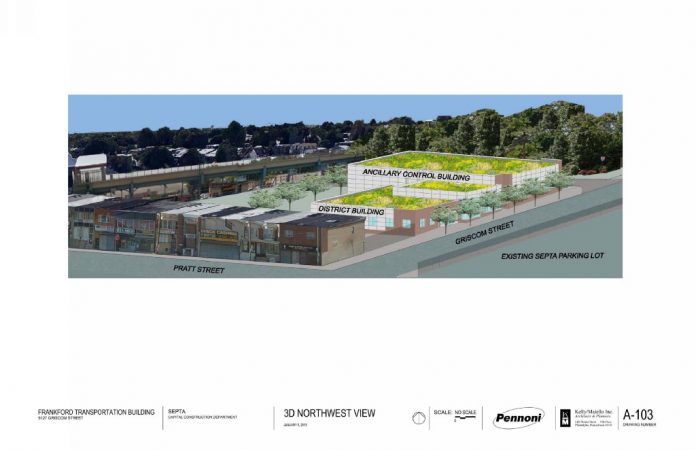Planning ahead: A SEPTA representative said that the transportation agency is willing to redevelop its employee parking lot at Pratt and Griscom streets for commercial uses sought by the community. Such a project would not conflict with the agency’s plan to build the control center and district office on an adjacent parcel. Above, an artist rendering for the project is shown. SOURCE: SEPTA
A clash between Frankford community leaders and SEPTA over the agency’s planned construction of a new $12 million control center and a $9.7-million district office near the Frankford Terminal eased last Thursday when agency officials said they would help bring a new supermarket to the neighborhood.
During a public meeting hosted by state Rep. Jason Dawkins, SEPTA’s assistant general manager for public and government affairs, Francis Kelly, said that the transportation agency is willing to redevelop its employee parking lot at Pratt and Griscom streets for commercial uses sought by the community. Such a project would not conflict with the agency’s plan to build the control center and district office on an adjacent parcel.
Frankford Community Development Corporation Executive Director Kim Washington described Kelly’s announcement as a first step in ensuring that the neighborhood doesn’t become Philadelphia’s next “food desert.”
“We started at a place where we were at total opposite ends of the spectrum,” Washington said. “It took a lot of push from the community, not only among ourselves but also to show up at SEPTA board meetings, to get our message to the top.”
The community first learned of SEPTA’s construction plans in March when the agency approached the CDC to solicit support for zoning changes for the affected property on the west side of Frankford Avenue, between Pratt and Dyre streets.
The neighborhood’s lone supermarket, Holiday Thriftway, is on the opposite side of Frankford Avenue, but its days are numbered. According to Washington, Rite Aid owns that property and plans to demolish the supermarket once the current lease expires in about two years. Rite Aid wants to build a new pharmacy there, Washington said.
CDC leaders figured that the vacant SEPTA-owned parcel would be a great place for a new supermarket, but SEPTA had other ideas. According to Kelly, the control center is a federally funded project and is crucial to public transportation in Philadelphia. It will be capable of coordinating rail and bus traffic throughout the region and serve as an auxiliary to SEPTA’s primary control facility at 1234 Market St. If the main control center goes down for any reason, the Frankford center can manage the system. The federal tax dollars will fund $9 million of the cost, with the state contributing $2.9 million and local sources $100,000.
Meanwhile, the new district office will abut the control center and serve Frankford-based SEPTA employees. The state will pay for $9.39 million of the cost with a local contribution of $310,000.
The CDC was still trying to persuade SEPTA to include some commercial development in the project on June 23 when the agency announced at a meeting of the Frankford Business and Professional Association that it would soon break ground on the control center and district office. SEPTA had gotten City Council to approve the zoning changes without the CDC’s input. Shocked by that news, Washington organized a demonstration at SEPTA’s public board meeting two days later. About 35 protesters joined the CDC leader, who reportedly debated Kelly about the issue for an hour.
During the intervening weeks, Washington lobbied Dawkins, state Rep. John Taylor, Councilwoman Maria Quinones-Sanchez, Congressman Brendan Boyle and other elected officials to intervene on the community’s behalf. Washington argued that large developable parcels are rare in Frankford so any transportation-related projects should also include commercial components that will boost the local economy, benefitting residents and SEPTA.
“We can’t let an asset like that develop without something that has a larger economic impact on the community,” Washington said.
Kelly said that SEPTA will seek proposals from developers for the existing employee parking lot at Pratt and Griscom through a formal bidding process. The community will have input in determining the best option among those received. Ultimately, Kelly said, SEPTA will retain ownership of the new commercial development, leasing it to its future occupants. SEPTA has room in a nearby parking garage for employees to park.
“We want a better community around the transportation center because that’s better for us,” Kelly said.
SEPTA officials have not announced a timetable for a bidding process.
“At the end of the day, if we can bring a supermarket and we can bring jobs to Frankford, that’s the way to go,” Washington said. “The community needs to be considered any time anything comes to Frankford. I think we’re moving in the right direction, but we have to put our trust on the line and give SEPTA time to do what they say they’re going to do.” ••





